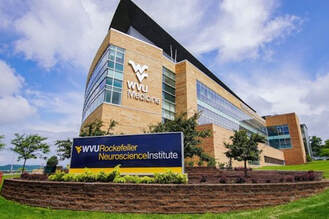 Authors: William Blanks BSc (1), Divine Nwafor PhD (1, 2), and Cara Sedney MD (1). Affiliations: (1) Department of Neurosurgery, West Virginia University School of Medicine, WV, USA. (2) Department of Neuroscience, West Virginia University School of Medicine, WV, USA. Introduction to WVU Neurosurgery West Virginia University's (WVU) neurosurgery residency program trains neurosurgery leaders who can command a high degree of competence in both clinical and academic settings. Situated in Morgantown, WV, the WVU neurosurgery residency program is a seven-year (84 months) program that prepares residents to become highly skilled in managing a broad spectrum of neurological disorders. Upon completion of the program, residents are prepared to practice in a variety of settings including private practice and academic medicine. A unique feature of WVU's neurosurgical residency program is its highly individualized interactions between trainees and faculty. This intimate interaction ensures clinical competency is achieved across the six ACGME core competencies. Residents work together through peer mentorship and guidance to learn operative and non-operative skills. Perks available to residents are meal access to the hospital eatery (including Starbucks), monthly wellness dinners, and semi-yearly retreats. Third-year WVU medical students can rotate with the neurosurgical team during their surgical clerkship. Students interested in pursuing neurosurgery as a career have a dedicated four-week elective during their final year. The four-week elective is open for both home and away students via VSLO. Sitting at the intersection of WV, PN, and OH, Morgantown is affordable and able to cater to a wide variety of interests and hobbies. Canoeing, mountain biking, and rock climbing are popular outdoor activities. Morgantown is full of amenities that include comfortable living–local bakeries, coffee shops, and eateries. Pittsburgh is within a 90-minute drive and offers a getaway on weekends. Likewise, major cities like Washington DC and Columbus are within a three- and half-hour drive. Locals will frequently make day trips to catch a show or go shopping. WVU's neurosurgery department spans three regional hospitals. Furthermore, WVU is home to the world-class Rockefeller Neuroscience Institute, a leader in functional neurosurgery and interdisciplinary neurosurgical care [2] [3]. The Rockefeller Neuroscience Institute (RNI), under the leadership of Dr. Ali Rezai, is the home of several major groundbreaking clinical trials. A few of these trials include deep-brain stimulation for Parkinson's disease, neuromodulation for drug addiction, and focused ultrasound with antibody therapy for early-stage Alzheimer's disease. For medical students interested in our program, applications are submitted through ERAS, and residents are selected via the National Residency Matching Program. Residents must maintain licensure through either the West Virginia Board of Medicine or the West Virginia Osteopathic Board of Medicine. Residents are expected to maintain a high degree of professionalism and clinical competence. Junior Years The PGY-1 year consists of two six-month rotations: General Care/Clinical Neurosciences (incorporating trauma, endovascular, radiation oncology, and gamma knife) and Neurocritical Care (including anesthesia). Residents must complete USMLE Step 3 during this year. During PGY-2, residents are expected to involve themselves in a QI project. The majority of this year is focused on taking leadership in managing inpatient care. Half of the PGY-3 rotation is inpatient care, with the other half divided between endovascular and pediatric neurosurgery. The PGY-4 year allows for flexibility whereby residents can conduct research (basic and/or clinical) or may pursue an enfolded fellowship in an area of interest (see below). Senior Years The PGY-5 year marks the transition to a senior resident in the neurosurgery service. Similar to PGY-3, this year is dedicated to neurosurgery service for half the year, with the remaining half split between endovascular and pediatrics. The chief year is split between the PGY-6 and PGY-7 years. The first half of the PGY-6 year is dedicated to general neurosurgical care, with the remaining half geared toward performing the role of chief resident. Fellowships Fellowships offered include Stereotactic/Functional (CAST), Enfolded Neurocritical Care (CAST), and Endovascular Neurosurgery (CAST) [3]. The one-year Stereotactic/Functional CAST Fellowship includes collaboration between neurology, psychology, psychiatry, neurophysiology, and radiology. During this fellowship, residents will work closely with Drs Ali Rezai, Peter Konrad, and Nicholas Brandmeir – leaders in the functional neurosurgery field [4]. The Endovascular CAST Neurosurgery Fellowship is one to two years depending on prior experience. Graduating fellows have typically participated in 350-400 neuro-interventional procedures (not including diagnostic angiography) during their tenure [5]. Contact Melissa Acocella for more information about the residency or fellowship (melissa.acocella@hsc.wvu.edu) References:
Conflicts of Interest: The authors report no conflicts of interest concerning the material or methods used to develop this manuscript. Acknowledgements: No acknowledgements. Brain & Spine Report Medical Student Neurosurgery Training Center Comments are closed.
|
Categories
All
Archives
October 2023
|





11/15/2022